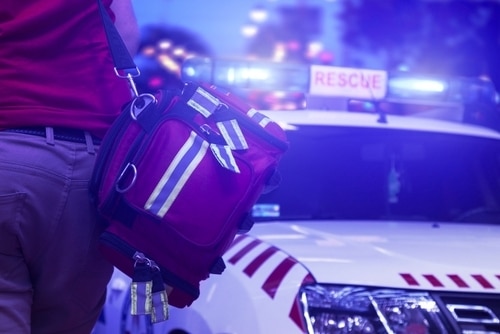EMS Week, (May 21 – 27) is an annual celebration and recognition of Emergency Medical Service (EMS) providers, Emergency Medical Technicians (EMTs), and Paramedics. EMS providers make a 24/7 commitment to saving the lives of people in their communities. They are the health safety net for millions of people who call 911, needing both emergent and non-emergent care.
We often think of EMTs and paramedics being the first to respond to accidents and physiological crises, like heart attacks, strokes, and major injuries. But, did you realize that they often play a significant role in helping those facing mental health or addiction-related crisis as well?
Paramedics and EMTs often provide psychological first aid to people in addition to physical first aid. They often help both the patient and any others at the scene dealing with the emotional impact of an accident, injury, or sudden shocking event.
They also have to have the skills to identify different signs of stress, observe and document various defense mechanisms, and assess the existing conditions and situations that are affecting the person’s illness or behavior. Sometimes a person’s mental health condition that is not apparent in a physician’s office becomes immediately apparent in their home environment. When EMS providers arrive at the home of someone in crisis, they are prepared to identify, and document signs of a mental health condition or drug misuse and notify the patient’s physicians, helping to ensure that they will receive the exact type of care they need. Without their courage and quick thinking, we’d likely lose even more people to drug overdoses, suicide, and violence each year than we already do.
When Being “Always In Service” Takes Its Toll
Some EMS providers, like the people they serve, also struggle with alcoholism, addiction, and mental health conditions such as PTSD and depression—all of which can often be triggered by the repeated daily stresses of their job. And, ironically, many don’t get the help they need with these struggles until they’ve reached their own crises.
Mental health issues can come with an additional layer of shame for first responders because their identity is formed around the belief that they are the rescuers, not the ones who need to be rescued. It’s important to remember, however, that addiction and depression are not signs of weakness. They are simply signs that your brain, mind, and body have been exposed to a great deal of trauma, and necessitates treatment designed to simultaneously address the neurological, physiological, and psychological aspects of these disorders.
Thank You, Emergency Service Providers!
From the entire Meadows Behavioral Healthcare team, we’d like to thank all EMTs, paramedics, and first responders who are out there day-to-day giving so many people a second (or sometimes third, fourth, or fifth…) chance at recovery. Like us, many EMS workers seem to believe that no matter how much of “a mess” a person may seem to be when they’re trapped in their illness, that they are still a person who matters, that they are never beyond help, and that they are worth saving. You are often unsung heroes in our lives, and in the lives of our patients, families, and friends.

